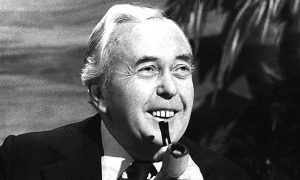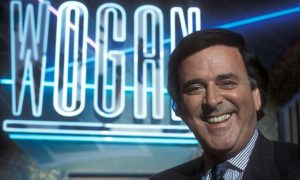In the autumn of 1983, BBC1 showed a strand of single plays in the Play for Today slot which, though sharing many themes, and indeed writers, directors and actors, with the strand proper, were not produced or promoted as Play for Today, but as stand-alone plays (or ‘films’) in their own right – and generally got rather more publicity than Play for Today was then garnering. They’re included here, seeing as we’re damned if we don’t by the pedants anyway, as ‘unofficial’ entries in the canon.
Being Normal
By Brian Phelan
Couple David Suchet and Anna Carteret enlist the help of writer friend William Simons to draw attention to the plight of their daughter Sadie, who suffers from growth restriction disorder Turner’s Syndrome.
Gunfight At The Joe Kaye Corral
By Alan Shinwell
Kaye (Mark Eden) becomes a desperate man when the recession starts to bite, and the bank forecloses on his clothing factory. So desperate, he’s open to any offers of work, even from (literal) cowboys… This and the following three plays were promoted together as a series “in which people try to find new ways of life”.
Ring Of Keys
By Frank Ash
Nineteen-year-old Iain Andrew takes advantage of a Highland hostelling holiday to escape his stifling home life and overbearing mother (Jan Wilson).
Bazaar and Rummage
By Sue Townsend
A self-help group of female agoraphobics attempt to overcome their fears by running a charity jumble sale at the town hall. The group, led by ex-agoraphobe Gwenda (Frances Tomelty) comprises obsessive-compulsive cleaner Bell-Bell (Brigit Forsyth), Katrina, a cabaret singer who was traumatically driven off stage in a hail of plastic pineapples and never recovered, and Margaret, who has remained indoors since being raped as a teenager fifteen years ago. Social worker Fliss (Juliet Stevenson) is brought in to keep things under control as the quartet battle with their neuroses. Adrian Mole author Townsend’s jokey treatment of a largely taboo subject angered many real agoraphobics, but the play remains popular in rep to this day.
Floating Off
By Stephen Davis
Businessman Peter Woodthorpe pushes through a deal with Graham Crowden’s merchant bank behind his son’s back, in order to try and start a new life with his secretary, Brenda Blethyn.
Stan’s Last Game
By Willis Hall
James Grout and Bert Parnaby are rival chairmen of a northern football club in the run-up to an important cup match. As tempers fray, retiring president Charles Lamb provides a calming voice of sanity.
Submariners
By Tom McClenaghan
Strange, near-farcical take on tensions, eccentricities and sexuality among the crew of a Polaris submarine, on a six-week tour of duty off the coast of Faslane in Scotland. Among their number, Neil Pearson is the wily, mascara-wearing, cross-dressing messhand AB Seaman ‘Cock’ Roach, using his Bilko-esque charm to scale the naval pecking order and positively thrive in this tiny, cloistered world
Martin Luther – Heretic
By William Nicholson
Transmitted on the 500th anniversary of the Protestant church founder’s birth, Jonathan Pryce takes the lead role in this dramatised account of his life (with plenty of flint-eyed to-camera addresses), alongside Maurice Denham, David de Keyser, Valentine Dyall and The Medieval Players.
Reith
By Roger Milner
Two-part dramatisation of the career of the BBC’s founding father, taken from his copious diaries and scrapbooks. Tom Fleming plays the guardian of the nation’s morals.
One of Ourselves
By William Trevor
In an Irish village (Cappoquin, Co. Waterford) in the late ’50s, young boy Stephen Mason turns fifteen and starts leaving his childhood behind, especially childlike, harmless ‘village idiot’ Cyril Cusack.
An Englishman Abroad
By Alan Bennett
Dramatised account of actress Coral Browne’s encounters with exiled spy Guy Burgess while touring the Soviet Union with the Royal Shakespeare Company’s production of Hamlet in 1961. Homesickness for the country he betrayed looms large, as does the lack of bath plugs in Muscovite hotels. Browne plays herself, Alan Bates is Burgess, and Mark Wing-Davey and Charles Gray are among the touring players. Suitably austere bits of Northern towns play Moscow. John Schlesinger directs. A BAFTA award-winning play, contrasting with Dennis Potter’s Traitor, on much the same subject, in 1971.
The Aerodrome
By Rex Warner
Warner adapts his own 1941 novel of a small village being slowly engulfed by the nearby RAF base. Peter Firth, son of the village clergyman (Richard Briers) sees the Air Force, with it’s exciting new jet fighters, as a glamorous escape from the stifling rural life, and enlists, only to find the base being run by a malevolent Air Vice-Marshal (Richard Johnson) with fascistic, dictatorial ambitions. Controversial in 1941 for suggesting the military is a breeding ground for fascism (with good reason – both Hermann Goering and Sir Oswald Moseley were former WWI ‘flying aces’) this play was immensely popular on transmission, perhaps because what had by then become period trappings and nostalgic recreation lent a pleasant sugar coating to the story.
The Crystal Spirit: Orwell on Jura
By Alan Plater
Ronald Pickup plays George Orwell, writing 1984 in his remote Scottish farmhouse in the late 1940s, believing he has only a few years left to complete his work due to the onset of tuberculosis. Fiona Walker plays his wife. The title was taken from a poem he wrote in honour of an Italian militiaman he encountered during the ish Civil War (“But the thing that I saw in your face/No power can disinherit/No bomb that ever burst/Shatters the crystal spirit.”)






















Richardpd
January 8, 2022 at 3:08 pm
I remember some girls performing Bazaar and Rummage when I was doing my GCSE in Drama.
Quite well written, with plenty of Victoria Wood “lite” lines here & there.